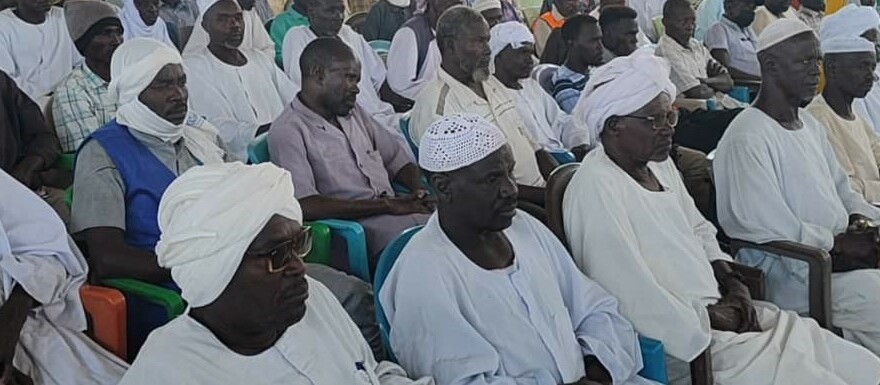A preparatory meeting was held on Monday at Kalma IDP Camp in South Darfur State to discuss arrangements for the Darfur Humanitarian Issues Conference, which is scheduled to take place in May at the camp. Kalma camp is located at 18 kilometers from Nyala, the state capital.
The meeting was attended by members of the preparatory committee and leaders of the displaced persons and refugees.
Yagoub Mohammed Abdullah, the Coordinator of the IDP and Refugee Camps in Darfur, told Radio Tamazuj that the ongoing war has dramatically affected children and the elderly in the region.
“We know that the war broke out before the beginning of the agricultural season, and due to the war, the season has failed. Humanitarian organizations working in Darfur have stopped due to the war, leading to a threat of famine,” he said.
Regarding education, Yagoub clarified that education has completely stopped at Kalma camp, indicating that all schools in the camp have become shelters for the newly displaced persons who fled from Nyala City due to clashes between the Sudanese army and the paramilitary Rapid Support Forces (RSF).
He called on the warring parties to cease hostilities and facilitate the delivery of humanitarian aid to people in need as soon as possible. “We don’t care from which path humanitarian aid arrives. So, what matters to us is that it reaches to save people from famine,” he said.
Meanwhile, Musa Abdelrahman, a youth leader at the Kalma camp, revealed that more than 400 people, including children, have died in the camp due to starvation.
He appealed to donors to consider the humanitarian conditions of the displaced persons in all the camps and their urgent need for food in Darfur.
Moreover, the Women’s Union Chairperson at the camp, Hanan Hassan Khatir, said: “All people in Kalma camp are facing extremely complex humanitarian conditions this year due to food shortages and deteriorating health conditions.”
She added, “This suffering is greater than what we faced at the beginning of displacement in 2003 when international organizations worked to provide humanitarian services to the needy.”
Similarly, the representative of Women Against Injustice, a member of the preparatory committee, Sarah Mustafa, stated in her speech at the preparatory meeting that their participation aims to alleviate the catastrophic humanitarian conditions within the displacement camps due to the war in Sudan.
She said, “In April last year, we launched the ‘Women Against Injustice’ campaign, with the participation of 66 organizations from inside and outside Sudan, to call on the international community to assist those affected by the war in Darfur.”
Sarah emphasized the need to take necessary measures to reduce hunger levels in the Darfur region.
The army and the RSF began battling each other in mid-April last year as tensions over plans for a new political transition and restructuring of the military erupted into heavy fighting.
The conflict has driven nearly 8.5 million people from their homes, creating the world’s biggest displacement crisis, pushed parts of the 49-million population close to famine, and triggered waves of ethnically driven killings and sexual violence in the western region of Darfur.




